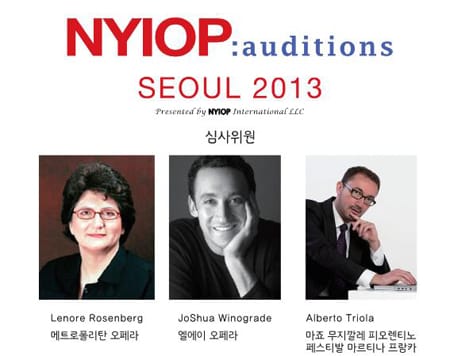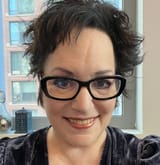What You Need to Know About the NYIOPs

The NYIOP International Auditions, or the NYIOPs, were born out of the frustration facing aspiring international opera singers in their desire to audition for European, Domestic and International opera houses. The concept behind the NYIOPs reverses the traditional understanding of international opera auditions: The opera companies travel to hear the singers!
The NYIOP Process allows a singer the opportunity to be heard by numerous houses in one audition, also dramatically cutting the high costs traditionally associated with an “audition tour.” Thanks to the NYIOPs, the international opera market is finally open to singers from all over the world. All it takes is one audition!
— What Are the NYIOPs?
The first thing I want to share with you about David Blackburn, founder and manager of the NYIOP International Auditions, is that he is passionate about discovering and supporting new opera talent. He is adamant that any singer be granted a preliminary NYIOP audition, regardless of their background, training and experience, and he wants them to receive an impartial evaluation. "I don't ever look at resumes, personally, because I trust my ears," Blackburn explains. He desires the same openmindedness from the casting directors he invites to his auditions: "When we do the preliminary auditions, we don't even pass out resumes… If you're in this business for a living, you should know what you're hearing, what you like and don't like, and not base it on a resume. We don't pass out that information. If somebody asks for it, I'll email it to them after the preliminaries are over." While Blackburn is gratified by all of the successes that the NYIOPs have helped to foster over the past 11 years, he has been particularly gratified when his organization has given career-making boosts to singers who had been toiling in obscurity and on the verge of giving up.
For Blackburn, the opportunity to discover new talent was a welcome additional outcome of the NYIOPs rather than part of their original mission. His idea was to provide a vehicle whereby European opera houses could audition emerging American singers who were already building careers in the US and thus could not afford adequate time to go on an audition tour overseas. "It dawned on me that singers have always wanted to sing for the European houses, especially the German houses," he told Cindy Sadler when she interviewed him for her 2003 article in Classical Singer. His company had been approached to establish a new international competition, but he had a better idea: "If we were going to undertake a production, why not make it an audition where multiple people could benefit, and create a situation where a lot of people could possibly get gainful employment?" Since their 2003 launch, the NYIOPs have expanded to include sessions in many cities beyond New York. This month they will hold two major rounds of auditions, in Seoul from June 9th to 13th and then Florence, from the 22nd to the 25th.

Something else I must share with you about David Blackburn is how I ended up having a conversation with him last week.
For some time I have held deep concerns about the high audition fees and apparent low success rates endured by singers who participate in the NYIOP auditions. The fees to audition start at $300 and are sometimes as high as $650 (that's what you must pay to be heard in Florence later this month). Since they first opened up shop, I have personally been aware of only two singers who received contracts as the result of a NYIOP audition, and both already had management and healthy emerging careers. In spite of how small the opera world is, many of my teacher and singer colleagues could not name even one performer who had landed any work through the NYIOPs. It was widely rumored that while unmanaged singers always paid the full fee to audition, managed singers were often heard for free. A search on the NFCS Recommendations and Warnings forum yields a slew of pessimistic NYIOP stories.
Readers of this blog know that I have no patience for organizations who charge singers vast sums of money and provide no discernible value in return. I finally vented my displeasure on my Facebook page after a highly professional member of my studio performed a NYIOP audition, was not offered any work, and received a feedback sheet upon which was barely legibly scrawled, "Unfortunately not good performance, work on technique and voice."
A scathing discussion ensued online, and Blackburn saw it. He immediately sent a message to invite me to Skype and talk with him about my concerns.
Blackburn, who up until very recently has not engaged in any social media concerning the NYIOPs, was utterly alarmed that his efforts could possibly be perceived in so negative a light. "I believe very strongly in what I do, and what I've been doing, but I am somehow the singer devil these days," he told me. "I had hoped to be a force of good for singers and it seems I am thought of quite differently."
He proceeded to rattle off a long list of distinguished artists who had benefited from the NYIOPs early in their careers. I was indeed familiar with most of their names. I just had no idea that the NYIOPs had played a role in their development.
I began to sense the nature of this disconnect.
First, while Blackburn himself knows how much his work has helped people, the greater community has not been informed of those details. Second, his focus has naturally been on the success stories. After all, those are the stories he hears about. He wasn't hearing about the frustration singers experience when they scrape together that high audition fee only to be turned away after a preliminary audition and get feedback admonishing them to "work on technique and voice".
Here is what we discussed.
Transparency
One of my major concerns about the NYIOPs is the dearth of available information about what happens after you sing for them. Their FAQ page attempts to address the questions of what you'll get for your money and whether you'll receive feedback, but all you're really guaranteed is a preliminary audition.
Blackburn has not collected statistics on how many singers get work from these auditions, in part because it seems so difficult to keep track of the data and also because he simply has no real support staff to assist with a project of that scope. "What ultimately matters to me is that people are getting not just contracts, but professional benefits," he explained. "You have to think beyond contracts. You may sing for someone today, and have nothing come of it, but if you make a strong impression they may get in touch three years down the line. You see it all the time."
On the one hand, anyone who has been in this business a while appreciates the truth of what he is saying. On the other hand, if he doesn't collect data and report on the success of his auditions, who will? Sometimes he only finds out that a singer landed a contract from a NYIOP audition years later when he comes upon their resume or web site and sees that they've performed with a company he knows first heard them through his organization. At other times, managers have even been known to discourage singers on their roster from crediting the NYIOPs with helping them make these connections because the manager fears it will detract from the quality of their own brand.
Regardless of the difficulty, I wish Blackburn would do what he can to collect as much data as possible on the results of his auditions. Cindy's Classical Singer article reported some great details on the results of the inaugural round, so it can be done. Singers could also be required to sign a waiver as part of the audition application stating that any work they receive as the result of their NYIOP audition can be used for statistical and marketing purposes.
Blackburn has begun collecting testimonials from both singers and impresarios and posting them on the NYIOP Facebook page. That does help.
Do managed singers audition for free? No, and they never really did, although the managed singers themselves may not have been aware of the arrangement that their managers made on their behalf. Blackburn briefly agreed to fill open audition slots by offering them to managers with the understanding that they or the singers would be responsible for the full fee if any contract resulted from the audition. It is therefore true that during this time, managed singers who performed unsuccessful NYIOP auditions did so for no fee. This is the origin of the rumors that unmanaged singers were subsidizing the opportunity for managed singers, but this policy is no longer in play and has not been for some time.
What are your chances of being advanced from the preliminary auditions to the finals? Blackburn estimates that on average, 17 to 22 percent of the singers advance. This is important information for a singer to have when deciding whether a NYIOP audition will be a good investment, and I wish they would include it in their FAQ. Given Blackburn's unwillingness to screen anyone out, the numbers don't surprise me or strike me as at all unfair and I do not think that making this information available would diminish the number of applications he receives. I just think it good business practice to let singers know that they stand only a 17 - 22% chance of being heard by the full panel of casting directors being assembled for the audition.
What about that 78 - 83% who don't advance? What value do they get for their money?
This is obviously my other major concern.
David Blackburn doesn't want to screen out applicants. He's helped enough singers over the years who had previously been toiling in obscurity to know that were he to screen, he'd be screening out some of the people in greatest need of the leg up that the NYIOPs can potentially provide.
The problem is that the 78 - 83% of singers who don't advance aren't the ones who are actually ready to be "discovered". They're the ones I wrote about in my previous post - the ones who come to New York (or Seoul, or Florence) fresh out of performance degree programs, incapable of producing a professional quality sound and lacking perspective on their career viability. They read the paragraphs I posted at the head of this post and sincerely believe that all that stands between them and the start of their dream career is a single audition. They rush to pay that high application fee, unaware that all they'll get for it is the information that the preliminary panel deems them not-yet-viable.
Before I spoke with David Blackburn, I believed that the only fair solution was for him to find a way to screen them out, but now I'm beginning to feel that perhaps he shouldn't.
These singers may not yet be viable for a career. It's likely that most of them never will be. But they will continue to come in droves to New York, Seoul, and Florence with dreams of discovery in their hearts, and they will continue to sign up for the NYIOP auditions.
These singers don't need a big break. What they need is information. They need someone who can tell them why they weren't included in the 17 - 22% who advanced to the finals. They need to know what still stands between them and the realization of their dream.
David Blackburn is in an ideal position to provide this information.
I've proposed that he hire an impartial expert to attend the preliminaries whose sole purpose is to provide candid, robust feedback for the singers - to inform them exactly why they didn't make the cut and what will have to change before they could. Since casting directors don't have the headspace to do this while they're trying to cast their shows and often don't have much interest in doing it anyway, why not bring in someone whose job it is to give the singers feedback? You could not possibly offer them anything of greater value.
Some singers will toss it in the trash and keep dreaming their pipe dreams. There's nothing you can do about that.
But my guess is that most will react in one of two ways. Either they'll roll up their sleeves and get down to the business of perfecting their package, or they'll have a watershed moment and see that this career is much more challenging than they'd thought and begin to consider other options. Both are fantastic outcomes, because the sooner you realize you've got your work cut out for you the sooner you can get it done, and the sooner you realize you're barking up the wrong tree, the sooner you'll stop.
The NYIOPs have always provided a very valuable opportunity for those few singers who are ready to take advantage of it. Since 78 - 83% of these audition fees are contributed by singers who aren't, I'd love to see something valuable provided to them as well.
Fall 2014 Update

The NYIOP site has now had a complete overhaul, advertising lower fees and a discount for advance registration. So it would seem that they are bringing the value of their product into closer alignment with what they are charging for it.
However, I object to their enticingly misleading new tagline: “Discovering - Informing - Connecting - Innovating”. It is so important that aspiring professional singers understand that you simply cannot be "discovered" as an opera singer. But young singers who do not fully understand what it takes to succeed are going to read about the NYIOPs, think this is their ticket to overnight success, and shell out the registration fee with no hope of getting anything in return. The NYIOPs do not “discover” anyone. Singers who get work through these auditions are already on the map, because no one would hire them if they weren't. It’s so irresponsible to use this word.
To date the NYIOPs also have not established a track record of “informing”. I wish they would provide information to singers in the shape of robust feedback on their auditions, and it seems like they could afford to given the price tag, but they still do not. They are advertising an online masterclass series to fulfill their mission to inform - further details will be necessary to evaluate this new enterprise, but it still won't benefit those singers who register for the auditions without realizing they aren't yet ready.
Yes, the NYIOPs have innovated the international audition process. It was and remains a great idea to gather a number of impresarios at a single audition so that a singer can be heard by multiple houses at once on their home turf. And yes, the NYIOPs have connected singers with performance opportunities.
As far as I can tell, they will continue to do this, and the 80% of the singers who apply with no hope of getting any value for their money will continue to pick up the tab.





